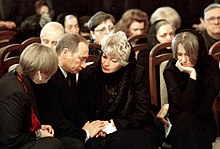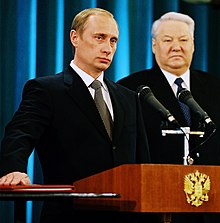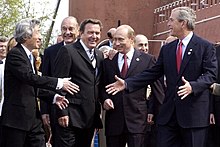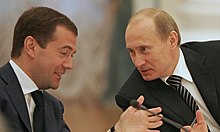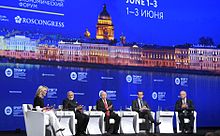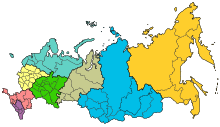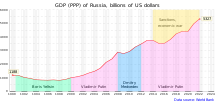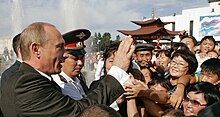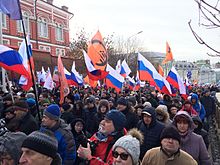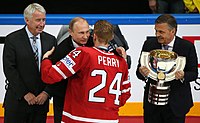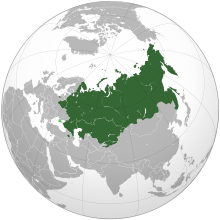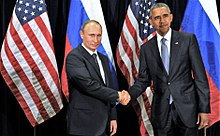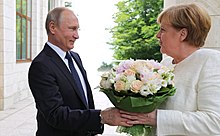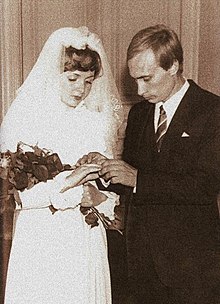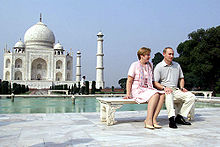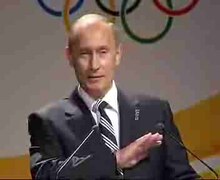| Vladimir Putin | |
|---|---|
 | |
| President of Russia | |
|
Assumed office 7 May 2012 | |
| Prime Minister |
Viktor Zubkov (Acting) Dmitry Medvedev |
| Preceded by | Dmitry Medvedev |
|
In office 7 May 2000 – 7 May 2008 Acting: 31 December 1999 – 7 May 2000 | |
| Prime Minister |
Mikhail Kasyanov Viktor Khristenko (Acting) Mikhail Fradkov Viktor Zubkov |
| Preceded by | Boris Yeltsin |
| Succeeded by | Dmitry Medvedev |
| Prime Minister of Russia | |
|
In office 8 May 2008 – 7 May 2012 | |
| President | Dmitry Medvedev |
| First Deputy |
Sergei Ivanov Viktor Zubkov Igor Shuvalov |
| Preceded by | Viktor Zubkov |
| Succeeded by | Dmitry Medvedev |
|
In office 16 August 1999 – 7 May 2000 Acting: 9 August 1999 – 16 August 1999 | |
| President | Boris Yeltsin |
| First Deputy |
Nikolai Aksyonenko Viktor Khristenko Mikhail Kasyanov |
| Preceded by | Sergei Stepashin |
| Succeeded by | Mikhail Kasyanov |
| Leader of All-Russia People's Front | |
|
Assumed office 12 June 2013 | |
| Preceded by | office established |
| Chairman of the Council of Ministers of the Union State of Russia and Belarus | |
|
In office 27 May 2008 – 18 July 2012 | |
| General Secretary | Pavel Borodin |
| Preceded by | Viktor Zubkov |
| Succeeded by | Dmitry Medvedev |
| Leader of United Russia | |
|
In office 7 May 2008 – 26 May 2012 | |
| Preceded by | Boris Gryzlov |
| Succeeded by | Dmitry Medvedev |
| First Deputy Prime Minister of Russia | |
|
In office 9 August 1999 – 16 August 1999 | |
| President | Boris Yeltsin |
| Preceded by | Viktor Khristenko |
| Succeeded by | Mikhail Kasyanov |
| Secretary of the Security Council | |
|
In office 9 March 1999 – 9 August 1999 | |
| Preceded by | Nikolay Bordyuzha |
| Succeeded by | Sergei Ivanov |
| Director of the Federal Security Service | |
|
In office 25 July 1998 – 29 March 1999 | |
| Preceded by | Nikolay Kovalyov |
| Succeeded by | Nikolai Patrushev |
| Personal details | |
| Born |
Vladimir Vladimirovich Putin 7 October 1952 Leningrad, Russian SFSR, Soviet Union |
| Political party |
All-Russia People's Front (2011–present) Independent (1991–95; 2001–08; 2012–present) |
| Other political affiliations |
Communist Party of the Soviet Union (1975–91) Our Home – Russia (1995–99) Unity (1999–2001) United Russia (2008–2012) |
| Spouse(s) | |
| Children |
|
| Residence | Novo-Ogaryovo, Moscow, Russia |
| Alma mater | Saint Petersburg State University |
| Awards |
|
| Signature |
|
| Website | Official website |
| Military service | |
| Allegiance |
|
| Service/branch | KGB |
| Years of service | 1975–1991 |
| Rank |
|
Vladimir Vladimirovich Putin (/ˈpuːtɪn/; Russian: Влади́мир Влади́мирович Пу́тин; born 7 October 1952) is a Russian politician and former intelligence officer serving as President of Russia since 2012, previously holding the position from 2000 until 2008. He was Prime Minister of Russia from 1999 until the beginning of his first presidency in 2000, and again between presidencies from 2008 until 2012. During his first term as Prime Minister, he served as Acting President of Russia due to the resignation of President Boris Yeltsin. During his second term as Prime Minister, he was the chairman of the ruling United Russia party.
Putin was born in Leningrad in the Soviet Union. He studied law at Leningrad State University, graduating in 1975. Putin was a KGB foreign intelligence officer for 16 years, rising to the rank of Lieutenant Colonel before resigning in 1991 to enter politics in Saint Petersburg. He moved to Moscow in 1996 and joined President Boris Yeltsin's administration, rising quickly through the ranks and becoming Acting President on 31 December 1999, when Yeltsin resigned. Putin won the 2000 presidential election by a 53% to 30% margin, thus avoiding a runoff with his Communist Party of the Russian Federation opponent, Gennady Zyuganov. He was reelected president in 2004 with 72% of the vote. During his first presidency, the Russian economy grew for eight straight years, and GDP measured in purchasing power increased by 72%. The growth was a result of the 2000s commodities boom, high oil prices, and prudent economic and fiscal policies. Because of constitutionally mandated term limits, Putin was ineligible to run for a third consecutive presidential term in 2008. The 2008 presidential election was won by Dmitry Medvedev, who appointed Putin as Prime Minister, the beginning of what some opponents considered to be a period of "tandemocracy".
In September 2011, after presidential terms were extended from four to six years, Putin announced he would seek a third term as president. He won the March 2012 presidential election with 64% of the vote, a result which aligned with pre-election polling. Falling oil prices coupled with international sanctions imposed at the beginning of 2014 after Russia's annexation of Crimea and military intervention in Eastern Ukraine led to GDP shrinking by 3.7% in 2015, though the Russian economy rebounded in 2016 with 0.3% GDP growth and is officially out of the recession. Putin gained 76% of the March 2018 presidential vote and was re-elected for a six-year term that will end in 2024.
Under Putin's leadership, Russia has scored poorly in Transparency International's Corruption Perceptions Index and experienced democratic backsliding according to both the Economist Intelligence Unit's Democracy Index and Freedom House's Freedom in the World index (including a record low 20/100 rating in the 2017 Freedom in the World report, a rating not given since the time of the Soviet Union). Experts no longer consider Russia to be a democracy, citing the lack of free and fair elections, purges and jailing of opponents, and curtailed press freedom. Human rights organizations and activists have accused Putin of persecuting political critics and activists, as well as ordering them tortured or assassinated; he has rejected accusations of human rights abuses. Officials of the United States government have accused him of leading an interference program against Hillary Clinton in support of Donald Trump during the U.S. presidential election in 2016, which both Trump and Putin have frequently denied and criticized. Putin has had domestic approval ratings above 60% since taking office in 1999.
Early life
Vladimir Vladimirovich Putin was born on 7 October 1952 in Leningrad, Russian SFSR, Soviet Union (now Saint Petersburg), the youngest of three children of Vladimir Spiridonovich Putin (1911–1999) and Maria Ivanovna Putina (née Shelomova; 1911–1998). His birth was preceded by the death of two brothers, Viktor and Albert, born in the mid-1930s. Albert died in infancy and Viktor died of diphtheria during the Siege of Leningrad in World War II. Putin's mother was a factory worker and his father was a conscript in the Soviet Navy, serving in the submarine fleet in the early 1930s. Early in World War II, his father served in the destruction battalion of the NKVD. Later, he was transferred to the regular army and was severely wounded in 1942. Putin's maternal grandmother was killed by the German occupiers of Tver region in 1941, and his maternal uncles disappeared at the war front.
On 1 September 1960, Putin started at School No. 193 at Baskov Lane, near his home. He was one of a few in the class of approximately 45 pupils who was not yet a member of the Young Pioneer organization. At age 12, he began to practice sambo and judo. He is a Judo black belt and national master of sports in Sambo. He wished to emulate the intelligence officers portrayed in Soviet cinema. Putin studied German at Saint Petersburg High School 281 and speaks German fluently.
Putin studied Law at the Leningrad State University (now Saint Petersburg State University) in 1970 and graduated in 1975. His thesis was on "The Most Favored Nation Trading Principle in International Law". While there, he was required to join the Communist Party of the Soviet Union and remained a member until December 1991.[43] Putin met Anatoly Sobchak, an assistant professor who taught business law (khozyaystvennoye pravo), and who would be influential in Putin's career.
KGB career
Putin in KGB uniform, circa 1980
In 1975, Putin joined the KGB and trained at the 401st KGB school in Okhta, Leningrad. After training, he worked in the Second Chief Directorate (counter-intelligence), before he was transferred to the First Chief Directorate, where he monitored foreigners and consular officials in Leningrad. From 1985 to 1990, he served in Dresden, East Germany, using a cover identity as a translator. Masha Gessen, a Russian-American who has authored a biography about Putin claims, "Putin and his colleagues were reduced mainly to collecting press clippings, thus contributing to the mountains of useless information produced by the KGB." According to Putin's official biography, during the fall of the Berlin Wall that began on 9 November 1989, he burned KGB files to prevent demonstrators from obtaining them.
After the collapse of the Communist East German government, Putin returned to Leningrad in early 1990, where he worked for about three months with the International Affairs section of Leningrad State University, reporting to Vice-Rector Yuriy Molchanov. There, he looked for new KGB recruits, watched the student body, and renewed his friendship with his former professor, Anatoly Sobchak, soon to be the Mayor of Leningrad. Putin claims that he resigned with the rank of Lieutenant Colonel on 20 August 1991, on the second day of the 1991 Soviet coup d'état attempt against the Soviet President Mikhail Gorbachev. Putin said: "As soon as the coup began, I immediately decided which side I was on", although he also noted that the choice was hard because he had spent the best part of his life with "the organs".
In 1999, Putin described communism as "a blind alley, far away from the mainstream of civilization".
Political career
1990–1996: Saint Petersburg administration
Vladimir Putin, Lyudmila Narusova and Ksenia Sobchak at the funeral of Putin's former mentor[55] Anatoly Sobchak, Mayor of Saint Petersburg (1990–1996).
In May 1990, Putin was appointed as an advisor on international affairs to the Mayor of Leningrad Anatoly Sobchak. On 28 June 1991, he became head of the Committee for External Relations of the Mayor's Office, with responsibility for promoting international relations and foreign investments and registering business ventures. Within a year, Putin was investigated by the city legislative council led by Marina Salye. It was concluded that he had understated prices and permitted the export of metals valued at $93 million in exchange for foreign food aid that never arrived. Despite the investigators' recommendation that Putin be fired, Putin remained head of the Committee for External Relations until 1996. From 1994 to 1996, he held several other political and governmental positions in Saint Petersburg.
In March 1994, Putin was appointed as First Deputy Chairman of the Government of Saint Petersburg. In May 1995, he organized the Saint Petersburg branch of the pro-government Our Home – Russia political party, the liberal party of power founded by Prime Minister Viktor Chernomyrdin. In 1995, he managed the legislative election campaign for that party, and from 1995 through June 1997, he was the leader of its Saint Petersburg branch.
1996–1999: Early Moscow career
Putin as FSB director, 1998
In June 1996 Sobchak lost his bid for reelection in Saint Petersburg, so Putin moved to Moscow and was appointed as Deputy Chief of the Presidential Property Management Department headed by Pavel Borodin. He occupied this position until March 1997. During his tenure, Putin was responsible for the foreign property of the state and organized the transfer of the former assets of the Soviet Union and Communist Party to the Russian Federation.
On 26 March 1997, President Boris Yeltsin appointed Putin deputy chief of Presidential Staff, which he remained until May 1998, and chief of the Main Control Directorate of the Presidential Property Management Department (until June 1998). His predecessor on this position was Alexei Kudrin and the successor was Nikolai Patrushev, both future prominent politicians and Putin's associates.
On 27 June 1997, at the Saint Petersburg Mining Institute, guided by rector Vladimir Litvinenko, Putin defended his Candidate of Science dissertation in economics, titled "The Strategic Planning of Regional Resources Under the Formation of Market Relations". This exemplified the custom in Russia for a rising young official to write a scholarly work in mid-career. When Putin later became president, the dissertation became a target of plagiarism accusations by fellows at the Brookings Institution; although the dissertation was referenced, the Brookings fellows asserted that it constituted plagiarism albeit perhaps unintentional. The dissertation committee denied the accusations.
On 25 May 1998, Putin was appointed First Deputy Chief of Presidential Staff for regions, replacing Viktoriya Mitina; and, on 15 July, he was appointed head of the commission for the preparation of agreements on the delimitation of power of regions and the federal center attached to the president, replacing Sergey Shakhray. After Putin's appointment, the commission completed no such agreements, although during Shakhray's term as the Head of the Commission 46 agreements were signed. Later, after becoming president, Putin canceled all those agreements.
On 25 July 1998, Yeltsin appointed Putin as Director of the Federal Security Service (FSB), the primary intelligence and security organization of the Russian Federation and the successor to the KGB.
1999: First premiership
On 9 August 1999, Putin was appointed one of three First Deputy Prime Ministers, and later on that day, was appointed acting Prime Minister of the Government of the Russian Federation by President Yeltsin. Yeltsin also announced that he wanted to see Putin as his successor. Later on that same day, Putin agreed to run for the presidency.On 16 August, the State Duma approved his appointment as Prime Minister with 233 votes in favor (vs. 84 against, 17 abstained), while a simple majority of 226 was required, making him Russia's fifth PM in fewer than eighteen months. On his appointment, few expected Putin, virtually unknown to the general public, to last any longer than his predecessors. He was initially regarded as a Yeltsin loyalist; like other prime ministers of Boris Yeltsin, Putin did not choose ministers himself, his cabinet was determined by the presidential administration.
Yeltsin's main opponents and would-be successors were already campaigning to replace the ailing president, and they fought hard to prevent Putin's emergence as a potential successor. Putin's law-and-order image and his unrelenting approach to the Second Chechen War against the Chechen Republic of Ichkeria, soon combined to raise Putin's popularity and allowed him to overtake all rivals.
While not formally associated with any party, Putin pledged his support to the newly formed Unity Party, which won the second largest percentage of the popular vote (23.3%) in the December 1999 Duma elections, and in turn he was supported by it.
1999–2000: Acting presidency
Putin in 1999
On 31 December 1999, Yeltsin unexpectedly resigned and, according to the Constitution of Russia, Putin became Acting President of the Russian Federation. On assuming this role, Putin went on a previously scheduled visit to Russian troops in Chechnya.
The first Presidential Decree that Putin signed, on 31 December 1999, was titled "On guarantees for former president of the Russian Federation and members of his family". This ensured that "corruption charges against the outgoing President and his relatives" would not be pursued. This was most notably targeted at Mabetex bribery case in which Yeltsin's family members were involved. On 30 August 2000, a criminal investigation (number 18/238278-95) was dropped in which Putin himself was one of the suspects as a member of the Saint Petersburg city government. On 30 December 2000, yet another case against the prosecutor general was dropped "for lack of evidence", in spite of thousands of documents passed by Swiss prosecution. On 12 February 2001, Putin signed a similar federal law which replaced the decree of 1999. The case of Putin's alleged corruption in metal exports from 1992 was brought back by Marina Salye, but she was silenced and forced to leave Saint Petersburg.
While his opponents had been preparing for an election in June 2000, Yeltsin's resignation resulted in the Presidential elections being held within three months, on 26 March 2000; Putin won in the first round with 53% of the vote.
2000–2004: First presidential term
Putin taking presidential oath beside Boris Yeltsin, May 2000
Putin addressing United Nations General Assembly during Millennium Summit, September 2000
The first major challenge to Putin's popularity came in August 2000, when he was criticized for the alleged mishandling of the Kursk submarine disaster. That criticism was largely because it was several days before Putin returned from vacation, and several more before he visited the scene.
Between 2000 and 2004, Putin set about the reconstruction of the impoverished condition of the country, apparently winning a power-struggle with the Russian oligarchs, reaching a 'grand bargain' with them. This bargain allowed the oligarchs to maintain most of their powers, in exchange for their explicit support for—and alignment with—Putin's government. A new group of business magnates emerged, including Gennady Timchenko, Vladimir Yakunin, Yury Kovalchuk, and Sergey Chemezov, with close personal ties to Putin.
A few months before elections, Putin fired Prime Minister Kasyanov's cabinet, and appointed Mikhail Fradkov to his place. Sergey Ivanov became the first civilian in Russia to be appointed to the Defense Minister position.
In 2003, a referendum was held in Chechnya, adopting a new constitution which declares that the Republic of Chechnya is a part of Russia; on the other hand, the region did acquire autonomy. Chechnya has been gradually stabilized with the establishment of the Parliamentary elections and a Regional Government. Throughout the Second Chechen War, Russia severely disabled the Chechen rebel movement; however, sporadic attacks by rebels continued to occur throughout the northern Caucasus.
2004–2008: Second presidential term
Vladimir Putin with Junichiro Koizumi, Jacques Chirac, Gerhard Schröder, Silvio Berlusconi, George W. Bush and other state leaders in Moscow, 9 May 2005
The near 10-year period prior to the rise of Putin after the dissolution of Soviet rule was a time of upheaval in Russia. In a 2005 Kremlin speech, Putin characterized the collapse of the Soviet Union as the "greatest geopolitical catastrophe of the Twentieth Century." Putin elaborated "Moreover, the epidemic of disintegration infected Russia itself." The country's cradle-to-grave social safety net was gone and life expectancy declined in the period preceding Putin's rule. In 2005, the National Priority Projects were launched to improve Russia's health care, education, housing and agriculture.
Putin with Chancellor of Germany Angela Merkel in March 2008
The continued criminal prosecution of Russia's then richest man, President of Yukos oil and gas company Mikhail Khodorkovsky, for fraud and tax evasion was seen by the international press as a retaliation for Khodorkovsky's donations to both liberal and communist opponents of the Kremlin. The government said that Khodorkovsky was "corrupting" a large segment of the Duma to prevent changes to the tax code. Khodorkovsky was arrested, Yukos was bankrupted and the company's assets were auctioned at below-market value, with the largest share acquired by the state company Rosneft. The fate of Yukos was seen as a sign of a broader shift of Russia towards a system of state capitalism. This was underscored in July 2014 when shareholders of Yukos were awarded $50 billion in compensation by the Permanent Arbitration Court in The Hague.
On 7 October 2006, Anna Politkovskaya, a journalist who exposed corruption in the Russian army and its conduct in Chechnya, was shot in the lobby of her apartment building, on Putin's birthday. The death of Politkovskaya triggered international criticism, with accusations that Putin has failed to protect the country's new independent media. Putin himself said that her death caused the government more problems than her writings.
In 2007, "Dissenters' Marches" were organized by the opposition group The Other Russia, led by former chess champion Garry Kasparov and national-Bolshevist leader Eduard Limonov. Following prior warnings, demonstrations in several Russian cities were met by police action, which included interfering with the travel of the protesters and the arrests of as many as 150 people who attempted to break through police lines.
On 12 September 2007, Putin dissolved the government upon the request of Prime Minister Mikhail Fradkov. Fradkov commented that it was to give the President a "free hand" in the run-up to the parliamentary election. Viktor Zubkov was appointed the new prime minister.
In December 2007, United Russia won 64.24% of the popular vote in their run for State Duma according to election preliminary results. United Russia's victory in the December 2007 elections was seen by many as an indication of strong popular support of the then Russian leadership and its policies.
2008–2012: Second premiership
Putin was barred from a third term by the Constitution. First Deputy Prime Minister Dmitry Medvedev was elected his successor. In a power-switching operation on 8 May 2008, only a day after handing the presidency to Medvedev, Putin was appointed Prime Minister of Russia, maintaining his political dominance.
Putin with Dmitry Medvedev, March 2008
At the United Russia Congress in Moscow on 24 September 2011, Medvedev officially proposed that Putin stand for the Presidency in 2012, an offer Putin accepted. Given United Russia's near-total dominance of Russian politics, many observers believed that Putin was assured of a third term. The move was expected to see Medvedev stand on the United Russia ticket in the parliamentary elections in December, with a goal of becoming Prime Minister at the end of his presidential term.
After the parliamentary elections on 4 December 2011, tens of thousands of Russians engaged in protests against alleged electoral fraud, the largest protests in Putin's time. Protesters criticized Putin and United Russia and demanded annulment of the election results. Those protests sparked the fear of a colour revolution in society. Putin allegedly organized a number of paramilitary groups loyal to himself and to the United Russia party in the period between 2005 and 2012.
2012–2018: Third presidential term
On 24 September 2011, while speaking at the United Russia party congress, Medvedev announced that he would recommend the party nominate Putin as its presidential candidate. He also revealed that the two men had long ago cut a deal to allow Putin to run for president in 2012. This switch was termed by many in the media as "Rokirovka", the Russian term for the chess move "castling". Medvedev said he himself would be ready to perform "practical work in the government".On 4 March 2012, Putin won the 2012 Russian presidential elections in the first round, with 63.6% of the vote, despite widespread accusations of vote-rigging. Opposition groups accused Putin and the United Russia party of fraud. While efforts to make the elections transparent were publicized, including the usage of webcams in polling stations, the vote was criticized by the Russian opposition and by international observers from the Organization for Security and Co-operation in Europe for procedural irregularities.
Anti-Putin protesters march in Moscow, 4 February 2012
Anti-Putin protests took place during and directly after the presidential campaign. The most notorious protest was the Pussy Riot performance on 21 February, and subsequent trial. An estimated 8,000–20,000 protesters gathered in Moscow on 6 May, when eighty people were injured in confrontations with police, and 450 were arrested, with another 120 arrests taking place the following day. A counter-protest of Putin supporters occurred which culminated in a gathering of an estimated 130,000 supporters at the Luzhniki Stadium, Russia's largest stadium. Some of the attendees stated that they had been paid to come, were forced to come by their employers, or were misled into believing that they were going to attend a folk festival instead. The rally is considered to be the largest in support of Putin to date.
Putin's presidency was inaugurated in the Kremlin on 7 May 2012. On his first day as president, Putin issued 14 Presidential decrees, which are sometimes called the "May Decrees" by the media, including a lengthy one stating wide-ranging goals for the Russian economy. Other decrees concerned education, housing, skilled labor training, relations with the European Union, the defense industry, inter-ethnic relations, and other policy areas dealt with in Putin's program articles issued during the presidential campaign.
In 2012 and 2013, Putin and the United Russia party backed stricter legislation against the LGBT community, in Saint Petersburg, Archangelsk and Novosibirsk; a law called the Russian gay propaganda law, that is against "homosexual propaganda" (which prohibits such symbols as the rainbow flag as well as published works containing homosexual content) was adopted by the State Duma in June 2013. Responding to international concerns about Russia's legislation, Putin asked critics to note that the law was a "ban on the propaganda of pedophilia and homosexuality" and he stated that homosexual visitors to the 2014 Winter Olympics should "leave the children in peace" but denied there was any "professional, career or social discrimination" against homosexuals in Russia.
In June 2013, Putin attended a televised rally of the All-Russia People's Front where he was elected head of the movement, which was set up in 2011. According to journalist Steve Rosenberg, the movement is intended to "reconnect the Kremlin to the Russian people" and one day, if necessary, replace the increasingly unpopular United Russia party that currently backs Putin.
Intervention in Ukraine and annexation of Crimea
Putin, with St. George ribbon, greets local residents during a visit to the Crimean city of Sevastopol on 9 May 2014
In 2014, Russia made several military incursions into Ukrainian territory. After Euromaidan protests and the fall of Ukrainian president Viktor Yanukovych, Russian soldiers without insignias took control of strategic positions and infrastructure within the Ukrainian territory of Crimea. Russia then annexed Crimea after a disputed referendum in which Crimeans voted to join the Russian Federation, according to official results. Subsequently, demonstrations by pro-Russian groups in the Donbass area of Ukraine escalated into an armed conflict between the Ukrainian government and the Russia-backed separatist forces of the self-declared Donetsk and Lugansk People's Republics. In August, Russian military vehicles crossed the border in several locations of Donetsk Oblast. The incursion by the Russian military was seen as responsible for the defeat of Ukrainian forces in early September.
Putin in talks with Ukrainian President Petro Poroshenko, German Chancellor Angela Merkel and French President François Hollande, 17 October 2014
In November 2014, the Ukrainian military reported intensive movement of troops and equipment from Russia into the separatist controlled parts of eastern Ukraine. The Associated Press reported 80 unmarked military vehicles on the move in rebel-controlled areas. An OSCE Special Monitoring Mission observed convoys of heavy weapons and tanks in DPR-controlled territory without insignia. OSCE monitors further stated they observed vehicles transporting ammunition and soldiers' dead bodies crossing the Russian-Ukrainian border under the guise of humanitarian aid convoys. As of early August 2015, OSCE observed over 21 such vehicles marked with the Russian military code for soldiers killed in action. According to The Moscow Times, Russia has tried to intimidate and silence human rights workers discussing Russian soldiers' deaths in the conflict. OSCE repeatedly reported that its observers were denied access to the areas controlled by "combined Russian-separatist forces".
The majority of members of the international community and organizations such as Amnesty International have condemned Russia for its actions in post-revolutionary Ukraine, accusing it of breaking international law and violating Ukrainian sovereignty. Many countries implemented economic sanctions against Russia, Russian individuals or companies – to which Russia responded in kind.
Putin and Turkish President Erdoğan attend Moscow's Cathedral Mosque opening ceremony, 23 September 2015
In October 2015, The Washington Post reported that Russia has redeployed some of its elite units from Ukraine to Syria in recent weeks to support Syrian President Bashar al-Assad. In December 2015, Russian Federation President Putin admitted that Russian military intelligence officers were operating in Ukraine.
Many members of the international community assumed that Putin's annexation of Crimea initiated the start of a completely new kind of foreign policy from Russia. They took the annexation of Crimea to mean that his foreign policy shifted "from state-driven foreign policy" to taking an offensive stance to re-create the Soviet Union. However, this policy shift can be understood as Putin trying to defend nations in Russia's sphere of influence from encroaching western power. While the act to annex the Crimea was bold and drastic, his "new" foreign policy may have more similarities to his older policies.
Intervention in Syria
On 30 September 2015, President Putin authorized Russian military intervention in the Syrian Civil War, following a formal request by the Syrian government for military help against rebel and jihadist groups.The Russian military activities consisted of air strikes, cruise missile strikes and the use of front line advisors and Russian special forces against militant groups opposed to the Syrian government, including the Syrian opposition, as well as Islamic State of Iraq and the Levant (ISIL), al-Nusra Front (al-Qaeda in the Levant), Tahrir al-Sham, Ahrar al-Sham and the Army of Conquest. After Putin's announcement on 14 March 2016 that the mission he had set for the Russian military in Syria had been "largely accomplished" and ordered the withdrawal of the "main part" of the Russian forces from Syria, Russian forces deployed in Syria continued to actively operate in support of the Syrian government.
Russia's interference in the US election
At a conference in St. Petersburg, NBC's Megyn Kelly repeatedly questioned Putin about alleged Russian cyberattacks.
2018–present: Fourth presidential term
Putin won the 2018 presidential election with more than 76% of the vote. His fourth term began in May 2018.7 May 2018, Vladimir Putin for the fourth time took office as President of Russia. On this day, Putin invited Dmitry Medvedev to form a new government. On 15 May 2018, Vladimir Putin took part in the opening of the movement along the highway section of the Crimean bridge. On 18 May 2018, Vladimir Putin signed decrees on the composition of the new Government. On 25 May 2018, Putin announced that he would not run for president in 2024, justifying this in compliance with the Russian Constitution. On a straight line on 7 June 2018, he told about his future successor. On 14 June 2018, opened as the head of the country-organizer of the XXI World Cup, which took place in Russia for the first time.
Domestic policies
Putin's domestic policies, especially early in his first presidency, were aimed at creating a vertical power structure. On 13 May 2000, he issued a decree putting the 89 federal subjects of Russia into seven administrative federal districts and appointed a presidential envoy responsible for each of those districts (whose official title is Plenipotentiary Representative).
On 13 May 2000, Putin introduced seven federal districts for administrative purposes. On 19 January 2010, the 8th North Caucasus Federal District (shown here in purple) was split from Southern Federal District. On 21 March 2014, the new 9th Crimean Federal District was formed after the annexation of Crimea and Sevastopol by the Russian Federation, but on 28 July 2016 it was incorporated into Southern Federal District.
According to Stephen White, Russia under the presidency of Putin made it clear that it had no intention of establishing a "second edition" of the American or British political system, but rather a system that was closer to Russia's own traditions and circumstances. Some commentators have described Putin's administration as a "sovereign democracy".
According to the proponents of that description, the government's actions and policies ought above all to enjoy popular support within Russia itself and not be determined from outside the country.
In July 2000, according to a law proposed by Putin and approved by the Federal Assembly of Russia, Putin gained the right to dismiss heads of the 89 federal subjects. In 2004, the direct election of those heads (usually called "governors") by popular vote was replaced with a system whereby they would be nominated by the president and approved or disapproved by regional legislatures. This was seen by Putin as a necessary move to stop separatist tendencies and get rid of those governors who were connected with organised crime. This and other government actions effected under Putin's presidency have been criticised by many independent Russian media outlets and Western commentators as anti-democratic. In 2012, as proposed by Putin's successor, Dmitry Medvedev, the direct election of governors was re-introduced.
During his first term in office, Putin opposed some of the Yeltsin-era oligarchs, as well as his political opponents, resulting in the exile or imprisonment of such people as Boris Berezovsky, Vladimir Gusinsky, and Mikhail Khodorkovsky; other oligarchs such as Roman Abramovich and Arkady Rotenberg are friends and allies with Putin.
Putin succeeded in codifying land law and tax law and promulgated new codes on labor, administrative, criminal, commercial and civil procedural law. Under Medvedev's presidency, Putin's government implemented some key reforms in the area of state security, the Russian police reform and the Russian military reform.
Economic, industrial, and energy policies
Russian GDP since the end of the Soviet Union
Historical crude oil prices. Economic growth in Putin's first two terms was fueled by the 2000s commodities boom, including high oil prices
During Putin's first eight years in office, industry grew substantially, as did production, construction, real incomes, credit, and the middle class. Putin has also been praised for eliminating widespread barter and thus boosting the economy. Inflation remained a problem however.
A fund for oil revenue allowed Russia to repay all of the Soviet Union's debts by 2005. Russia joined the World Trade Organization on 22 August 2012.
Control over the economy was increased by placing individuals from the intelligence services and the military in key positions of the Russian economy, including on boards of large companies. In 2005, an industry consolidation programme was launched to bring the main aircraft producing companies under a single umbrella organization, the United Aircraft Corporation (UAC). The aim was to optimize production lines and minimise losses. The UAC is one of Russia's "national champions" and comparable to EADS in Europe.
A programme was started to increase Russia's share of the European energy market by building submerged gas pipelines bypassing Ukraine and other countries which were often seen as non-reliable transit partners by Russia, especially following Russia-Ukraine gas disputes of the late 2000s (decade). Russia also undermined the rival pipeline project Nabucco by buying the Turkmen gas and redirecting it into Russian pipelines.
Russia diversified its export markets by building the Trans-Siberian oil pipeline to the markets of China, Japan and Korea, as well as the Sakhalin–Khabarovsk–Vladivostok gas pipeline in the Russian Far East. Russia has also recently built several major oil and gas refineries, plants and ports. There was also construction of major hydropower plants, such as the Bureya Dam and the Boguchany Dam, as well as the restoration of the nuclear industry of Russia, with 1 trillion rubles ($42.7 billion) which were allocated from the federal budget to nuclear power and industry development before 2015. A large number of nuclear power stations and units are currently being constructed by the state corporation Rosatom in Russia and abroad.
On 21 May 2014, Russia and China signed a $400 billion gas deal
A construction program of floating nuclear power plants will provide power to Russian Arctic coastal cities and gas rigs, starting in 2012. The Arctic policy of Russia also includes an offshore oilfield in the Pechora Sea which is expected to start producing in early 2012, with the world's first ice-resistant oil platform and first offshore Arctic platform. In August 2011 Rosneft, a Russian government-operated oil company, signed a deal with ExxonMobil for Arctic oil production.
The construction of a pipeline at a cost of $77 billion, to be jointly funded by Russia and China, was signed off on by President Putin in Shanghai on 21 May 2014. On completion in 4 to 6 years, the pipeline would deliver natural gas from the state-majority-owned Gazprom to China's state-owned China National Petroleum Corporation for the next 30 years, in a deal worth $400bn.
In 2014, the Organized Crime and Corruption Reporting Project named Putin their Person of the Year Award for furthering corruption and organized crime.
As noted by Russian journalists after the 2018 presidential inauguration, Putin has since 2007 repeated the prediction of Russia becoming "one of the world's fifth largest economies" roughly within 10 years from that date and the target was never achieved.
2014 financial crisis and economic downturn
The ongoing financial crisis began in the second half of 2014 when the Russian ruble collapsed due to a decline in the price of oil and international sanctions against Russia. These events in turn led to loss of investor confidence and capital flight. Though it has also been argued that the sanctions had little to no effect on Russia's economy.Russia responded with its own sanctions against the West. Additionally, to compensate for the sanctions, Russia developed closer economic ties with Eastern countries. In October 2014, energy, trade and finance agreements with China worth $25 billion were signed. The following year, a $400-billion 30-year natural gas supply agreement was also signed with China.
Environmental policy
In 2004, President Putin signed the Kyoto Protocol treaty designed to reduce greenhouse gases. However, Russia did not face mandatory cuts, because the Kyoto Protocol limits emissions to a percentage increase or decrease from 1990 levels and Russia's greenhouse-gas emissions fell well below the 1990 baseline due to a drop in economic output after the breakup of the Soviet Union.Putin personally supervises a number of protection programmes for rare and endangered animals in Russia, such as the Amur Tiger, the White Whale, the Polar Bear and the Snow Leopard.
Religious policy
Putin with religious leaders of Russia, 2001
Buddhism, Eastern Orthodox Christianity, Islam and Judaism, defined by law as Russia's traditional religions and a part of Russia's historical heritage, enjoyed limited state support in the Putin era. The vast construction and restoration of churches, started in the 1990s, continued under Putin, and the state allowed the teaching of religion in schools (parents are provided with a choice for their children to learn the basics of one of the traditional religions or secular ethics). His approach to religious policy has been characterized as one of support for religious freedoms, but also the attempt to unify different religions under the authority of the state. In 2012, Putin was honored in Bethlehem and a street was named after him.
Putin visiting the Tuva Republic, Siberia, 2007
Putin regularly attends the most important services of the Russian Orthodox Church on the main Orthodox Christian holidays. He established a good relationship with Patriarchs of the Russian Church, the late Alexy II of Moscow and the current Kirill of Moscow. As president, he took an active personal part in promoting the Act of Canonical Communion with the Moscow Patriarchate, signed 17 May 2007 that restored relations between the Moscow-based Russian Orthodox Church and the Russian Orthodox Church Outside Russia after the 80-year schism.
Putin and United Russia enjoy high electoral support in the national republics of Russia, in particular in the Muslim-majority republics of Povolzhye and the North Caucasus.
Under Putin, the Hasidic FJCR became increasingly influential within the Jewish community, partly due to the influence of Federation-supporting businessmen mediated through their alliances with Putin, notably Lev Leviev and Roman Abramovich. According to the JTA, Putin is popular amongst the Russian Jewish community, who see him as a force for stability. Russia's chief rabbi, Berel Lazar, said Putin "paid great attention to the needs of our community and related to us with a deep respect". In 2016, Ronald S. Lauder, the president of the World Jewish Congress, also praised Putin for making Russia "a country where Jews are welcome".
Military development
Putin in the cockpit of a Tupolev Tu-160 strategic bomber before the flight, August 2005
Aboard battlecruiser Pyotr Velikiy during Northern Fleet exercise in 2005
While from the early 2000s Russia started placing more money into its military and defense industry, it was only in 2008 that the full-scale Russian military reform began, aiming to modernize Russian Armed Forces and making them significantly more effective. The reform was largely carried out by Defense Minister Anatoly Serdyukov during Medvedev's Presidency, under the supervision of both Putin, as the Head of Government, and Medvedev, as the Commander-in-Chief of the Russian Armed Forces.
Key elements of the reform included reducing the armed forces to a strength of one million; reducing the number of officers; centralising officer training from 65 military schools into 10 'systemic' military training centres; creating a professional NCO corps; reducing the size of the central command; introducing more civilian logistics and auxiliary staff; elimination of cadre-strength formations; reorganising the reserves; reorganising the army into a brigade system, and reorganising air forces into an air base system instead of regiments.
The number of Russia's military districts was reduced to four. The term of draft service was reduced from two years to one, which put an end to the old harassment traditions in Russian army, since all conscripts became very close by draft age. The gradual transition to the majority professional army by the late 2010s was announced, and a large programme of supplying the Armed Forces with new military equipment and ships was started. The Russian Space Forces were replaced on 1 December 2011 with the Russian Aerospace Defence Forces.
In spite of Putin's call for major investments in strategic nuclear weapons, these will fall well below the New START limits due to the retirement of aging systems.
Putin has also sought to increase Russian territorial claims in the Arctic and its military presence here. In August 2007, Russian expedition Arktika 2007, part of research related to the 2001 Russian territorial extension claim, planted a flag on the seabed below the North Pole. Both Russian submarines and troops deployed in the Arctic have been increasing.
Human rights policy
Russian opposition protest in Moscow, 26 February 2017
An NGO based in the New York City; Human Rights Watch; in a report entitled Laws of Attrition, authored by Hugh Williamson, the British director of HRW's Europe & Central Asia Division, has claimed that since May 2012, when Putin was re-elected as president, Russia has enacted many restrictive laws, started inspections of nongovernmental organizations, harassed, intimidated, and imprisoned political activists, and started to restrict critics. The new laws include the "foreign agents" law, which is widely regarded as over-broad by including Russian human rights organizations which receive some international grant funding, the treason law, and the assembly law which penalizes many expressions of dissent. human rights activists have criticized Russia for censoring speech of LGBT activists due to "the gay propaganda law" and increasing violence against LGBT+ people due to the law.
The media
Scott Gehlbach, an American Professor of Political Science at the University of Wisconsin–Madison, has claimed that since 1999, Putin has reportedly punished journalists who challenge his official point of view. Maria Lipman, an American writing in Foreign Affairs (the journal of the Council on Foreign Relations), claims, "The crackdown that followed Putin's return to the Kremlin in 2012 extended to the liberal media, which had until then been allowed to operate fairly independently." The Internet has attracted Putin's attention because his critics have tried to use it to challenge his control of information. Marian K. Leighton, who worked for the CIA as a Soviet analyst in the 1980s says, "Having muzzled Russia's print and broadcast media, Putin focused his energies on the Internet." Robert W. Orttung and Christopher Walker report:- Reporters Without Borders, for instance, ranked Russia 148 in its 2013 list of 179 countries in terms of freedom of the press. It particularly criticized Russia for the crackdown on the political opposition and the failure of the authorities to vigorously pursue and bring to justice criminals who have murdered journalists. Freedom House ranks Russian media as "not free", indicating that basic safeguards and guarantees for journalists and media enterprises are absent.
Promoting conservatism
Putin attends the Orthodox Christmas service in the village Turginovo in Kalininsky District, Tver Oblast, 7 January 2016
Putin has promoted explicitly conservative policies in social, cultural and political matters, both at home and abroad. Putin has attacked globalism and neo-liberalism and is identified by scholars with Russian conservatism. Putin has promoted new think tanks that bring together like-minded intellectuals and writers. For example, the Izborsky Club, founded in 2012 by Alexander Prokhanov, stresses Russian nationalism, the restoration of Russia's historical greatness, and systematic opposition to liberal ideas and policies. Vladislav Surkov, a senior government official, has been one of the key ideologists during Putin's presidency.
In cultural and social affairs Putin has collaborated closely with the Russian Orthodox Church. Patriarch Kirill of Moscow, head of the Church, endorsed his election in 2012 stating Putin's terms were like "a miracle of God." Steven Myers reports, "The church, once heavily repressed, had emerged from the Soviet collapse as one of the most respected institutions... Now Kiril led the faithful directly into an alliance with the state."
Mark Woods, a Baptist minister and contributing editor to Christian Today, provides specific examples of how the Church has backed the expansion of Russian power into Crimea and eastern Ukraine. More broadly the New York Times reports in September 2016 how that Church's policy prescriptions support the Kremlin's appeal to social conservatives:
- "A fervent foe of homosexuality and any attempt to put individual rights above those of family, community or nation, the Russian Orthodox Church helps project Russia as the natural ally of all those who pine for a more secure, illiberal world free from the tradition-crushing rush of globalization, multiculturalism and women's and gay rights."
International sporting events
Captain of the Canada national team, Corey Perry, giving a hug for Putin, after winning the gold medal at the 2016 IIHF World Championship
Captain of the Croatia national football team, Luka Modrić, accepting the Golden Ball award at the hands of Putin after the 2018 FIFA World Cup Final
Putin has won international support for sport in Russia. In 2007, he led a successful effort on behalf of Sochi (located along the Black Sea near the border between Georgia and Russia) for the 2014 Winter Olympics and the 2014 Winter Paralympics, the first Winter Olympic Games to ever be hosted by Russia. Likewise, in 2008, the city of Kazan won the bid for the 2013 Summer Universiade, and on 2 December 2010 Russia won the right to host the 2017 FIFA Confederations Cup and 2018 FIFA World Cup, also for the first time in Russian history. In 2013, Putin stated that gay athletes would not face any discrimination at the 2014 Sochi Winter Olympics.
Wildlife protection and conservation
Putin is chairman of the Russian Geographical Society's board of trustees and is actively engaged in the protection of rare species. The programs are being conducted by the Severtsov Institute of Ecology and Evolution at the Russian Academy of Sciences.Foreign policy
Putin's visit to the United States in November 2001
Relations with South and East Asia
Putin and Chinese President Xi Jinping at the 2015 Moscow Victory Day Parade
In 2012, Putin wrote an article in the Hindu newspaper, saying that "The Declaration on Strategic Partnership between India and Russia signed in October 2000 became a truly historic step". Prime Minister Manmohan Singh during Putin's 2012 visit to India: "President Putin is a valued friend of India and the original architect of the India-Russia strategic partnership".
Putin's Russia maintains positive relations with other BRIC countries. The country has sought to strengthen ties especially with the People's Republic of China by signing the Treaty of Friendship as well as building the Trans-Siberian oil pipeline geared toward growing Chinese energy needs. The mutual-security cooperation of the two countries and their central Asian neighbours is facilitated by the Shanghai Cooperation Organisation (SCO) which was founded in 2001 in Shanghai by the leaders of China, Kazakhstan, Kyrgyzstan, Russia, Tajikistan, and Uzbekistan.
The announcement made during the SCO summit that Russia resumes on a permanent basis the long-distance patrol flights of its strategic bombers (suspended in 1992) in the light of joint Russian-Chinese military exercises, first-ever in history held on Russian territory, made some experts believe that Putin is inclined to set up an anti-NATO bloc or the Asian version of OPEC. When presented with the suggestion that "Western observers are already likening the SCO to a military organization that would stand in opposition to NATO", Putin answered that "this kind of comparison is inappropriate in both form and substance".
Relations with post-Soviet states
A series of so-called colour revolutions in the post-Soviet states, namely the Rose Revolution in Georgia in 2003, the Orange Revolution in Ukraine in 2004 and the Tulip Revolution in Kyrgyzstan in 2005, led to frictions in the relations of those countries with Russia. In December 2004, Putin criticised the Rose and Orange revolutions, saying: "If you have permanent revolutions you risk plunging the post-Soviet space into endless conflict".
Meeting with Mikheil Saakashvili, then-president of Georgia, in 2008
A number of economic disputes erupted between Russia and some neighbors, such as the Russian import ban of Georgian wine. And in some cases, such as the Russia–Ukraine gas disputes, the economic conflicts affected other European countries, for example when a January 2009 gas dispute with Ukraine led state-controlled Russian company Gazprom to halt its deliveries of natural gas to Ukraine, which left a number of European states, to which Ukraine transits Russian gas, with serious shortages of natural gas in January 2009.
The plans of Georgia and Ukraine to become members of NATO have caused some tensions between Russia and those states. In 2010, Ukraine did abandon these plans. Putin allegedly declared at a NATO-Russia summit in 2008 that if Ukraine joined NATO Russia could contend to annex the Ukrainian East and Crimea. At the summit he told US President George W. Bush that "Ukraine is not even a state!" while the following year Putin referred to Ukraine as "Little Russia". Following the 2014 Ukrainian revolution in March 2014, the Russian Federation annexed Crimea. According to Putin this was done because "Crimea has always been and remains an inseparable part of Russia". After the Russian annexion of Crimea he said that Ukraine includes "regions of Russia's historic south" and "was created on a whim by the Bolsheviks". He went on to declare that the February 2014 ousting of Ukrainian President Viktor Yanukovych had been orchestrated by the West as an attempt to weaken Russia. "Our Western partners have crossed a line. They behaved rudely, irresponsibly and unprofessionally," he said, adding that the people who had come to power in Ukraine were "nationalists, neo-Nazis, Russophobes and anti-Semites". In a July 2014 speech midst an armed insurgency in Eastern Ukraine Putin stated he would use Russia's "entire arsenal" and "the right of self defence" to protect Russian speakers outside Russia.
Putin opens Wall of Grief monument to victims of Stalinist repression, 30 October 2017
In late August 2014, Putin stated: "People who have their own views on history and the history of our country may argue with me, but it seems to me that the Russian and Ukrainian peoples are practically one people". After making a similar statement late December 2015 he stated: "the Ukrainian culture, as well as Ukrainian literature, surely has a source of its own".
In August 2008, Georgian President Mikheil Saakashvili attempted to restore control over the breakaway South Ossetia. However, the Georgian military was soon defeated in the resulting 2008 South Ossetia War after regular Russian forces entered South Ossetia and then Georgia proper, then also opened a second front in the other Georgian breakaway province of Abkhazia with Abkhazian forces.
Despite existing or past tensions between Russia and most of the post-Soviet states, Putin has followed the policy of Eurasian integration. Putin endorsed the idea of a Eurasian Union in 2011; the concept was proposed by the President of Kazakhstan in 1994. On 18 November 2011, the presidents of Belarus, Kazakhstan and Russia signed an agreement setting a target of establishing the Eurasian Union by 2015. The Eurasian Union was established on 1 January 2015.
Relations with the United States, Europe, and NATO
Putin meets with U.S. President Barack Obama in New York City, 29 September 2015
Under Putin, Russia's relationships with NATO and the U.S. have passed through several stages. When he first became president, relations were cautious, but after the 9/11 attacks Putin quickly supported the U.S. in the War on Terror and the opportunity for partnership appeared. However, the U.S. responded by further expansion of NATO to Russia's borders and by unilateral withdrawal from the 1972 Anti-Ballistic Missile Treaty.
From 2003, when Russia did not support the Iraq War and when Putin became ever more distant from the West in his internal and external policies, relations continued to deteriorate. According to Russia scholar Stephen F. Cohen, the narrative of the mainstream U.S. media, following that of the White House, became anti-Putin. In an interview with Michael Stürmer, Putin said there were three questions which most concerned Russia and Eastern Europe: namely, the status of Kosovo, the Treaty on Conventional Armed Forces in Europe and American plans to build missile defence sites in Poland and the Czech Republic, and suggested that all three were linked. His view was that concessions by the West on one of the questions might be met with concessions from Russia on another.
In a January 2007 interview, Putin said Russia was in favor of a democratic multipolar world and strengthening the systems of international law.
In February 2007, Putin criticized what he called the United States' monopolistic dominance in global relations, and "almost uncontained hyper use of force in international relations". He said the result of it is that "no one feels safe! Because no one can feel that international law is like a stone wall that will protect them. Of course such a policy stimulates an arms race". This came to be known as the Munich Speech, and former NATO secretary Jaap de Hoop Scheffer called the speech "disappointing and not helpful." The months following Putin's Munich Speech were marked by tension and a surge in rhetoric on both sides of the Atlantic. Both Russian and American officials, however, denied the idea of a new Cold War. Putin publicly opposed plans for the U.S. missile shield in Europe and presented President George W. Bush with a counterproposal on 7 June 2007 which was declined. Russia suspended its participation in the Conventional Forces in Europe treaty on 11 December 2007.
Putin opposed Kosovo's 2008 declaration of independence, warning supporters of that precedent that it would de facto destabilize the whole system of international relations.
Putin with Italian Prime Minister Silvio Berlusconi. The two leaders built up a close friendship
Putin had good relations with former American President George W. Bush, and many European leaders. His "cooler" and "more business-like" relationship with Germany's current chancellor, Angela Merkel is often attributed to Merkel's upbringing in the former DDR, where Putin was stationed as a KGB agent. While he had the most friendly and warmer relationship with the former Prime Minister of Italy Silvio Berlusconi; the two leaders often described their relationship as a close friendship, continuing to organize bilateral meetings even after Berlusconi's resignation in November 2011.
In late 2013, Russian-American relations deteriorated further when the United States canceled a summit (for the first time since 1960) after Putin gave asylum to Edward Snowden, who had leaked classified information from the NSA.
Relations were further strained after the 2014–15 Russian military intervention in Ukraine and the Annexation of Crimea.
In 2014, Russia was suspended from the G8 group as a result of its annexation of Crimea. However, in June 2015, Putin told an Italian newspaper that Russia has no intention of attacking NATO.
Putin held a meeting in Sochi with German Chancellor Angela Merkel to discuss Nord Stream 2 gas pipeline, 18 May 2018
On 9 November 2016, Putin congratulated Donald Trump on becoming the 45th President of the United States.
In December 2016, US intelligence officials (headed by James Clapper) quoted by CBS News stated that Putin approved the email hacking and cyber attacks during the U.S. election, against the democratic presidential nominee Hillary Clinton. A spokesman for Putin denied the reports. Putin has repeatedly accused Hillary Clinton, who served as U.S. Secretary of State from 2009 to 2013, of interfering in Russia's internal affairs, and in December 2016, Clinton accused Putin of having a personal grudge against her.
With the election of Trump, Putin's favorability among Americans in the United States received a sharp increase. According to Gallup, 22% of Americans have a positive view of Putin, the highest since 2003. According to Putin, the U.S.–Russian relations, which were already at the lowest level since the end of the Cold War, have further deteriorated since Trump took office in January 2017.
Relations with the United Kingdom
In 2003, relations between Russia and the United Kingdom deteriorated when the United Kingdom granted political asylum to Putin's former patron, oligarch Boris Berezovsky. This deterioration was intensified by allegations that the British were spying and making secret payments to pro-democracy and human rights groups.Poisoning of Alexander Litvinenko
The end of 2006 brought more strained relations in the wake of the death by polonium poisoning of former KGB and FSB officer Alexander Litvinenko in London, who became an MI6 agent in 2003. In 2007, the crisis in relations continued with expulsion of four Russian envoys over Russia's refusal to extradite former KGB bodyguard Andrei Lugovoi to face charges in the murder of Litvinenko. Mirroring the British actions, Russia expelled UK diplomats and took other retaliatory steps.In 2015–16, the British Government conducted an inquiry into the death of Alexander Litvinenko. Its report was released in January 2016. According to the report, "The FSB operation to kill Mr Litvinenko was probably approved by Mr Patrushev and also by President Putin." The report outlined some possible motives for the murder, including Litvinenko's public statements and books about the alleged involvement of the FSB in mass murder, and what was "undoubtedly a personal dimension to the antagonism" between Putin and Litvinenko, led to the murder. Media analyst William Dunkerley, writing in The Guardian, criticised the inquiry as politically motivated, biased, lacking in evidence, and logically inconsistent. The Kremlin dismissed the Inquiry as "a joke" and "whitewash".
Poisoning of Sergei Skripal
On 4 March 2018, former double agent Sergei Skripal was poisoned with a Novichok nerve agent in Salisbury. 10 days later, the British government formally accused the Russian state of attempted murder, a charge which Russia denied. After the UK expelled 23 Russian diplomats (an action which would later be responded to with a Russian expulsion of 23 British diplomats), British Foreign Secretary Boris Johnson said on 16 March that it was "overwhelmingly likely" Putin had personally ordered the poisoning of Skripal. Putin's spokesman Dmitry Peskov called the allegation "shocking and unpardonable diplomatic misconduct".
Relations with Australia and Latin American countries
Putin and his successor, Medvedev, enjoyed warm relations with the late Hugo Chávez of Venezuela. Much of this has been through the sale of military equipment; since 2005, Venezuela has purchased more than $4 billion worth of arms from Russia. In September 2008, Russia sent Tupolev Tu-160 bombers to Venezuela to carry out training flights. In November 2008, both countries held a joint naval exercise in the Caribbean. Earlier in 2000, Putin had re-established stronger ties with Fidel Castro's Cuba.In September 2007, Putin visited Indonesia and in doing so became the first Russian leader to visit the country in more than 50 years. In the same month, Putin also attended the APEC meeting held in Sydney where he met with John Howard, who was the Australian Prime Minister at the time, and signed a uranium trade deal for Australia to sell uranium to Russia. This was the first visit by a Russian president to Australia.
Relations with Middle Eastern and North African countries
On 16 October 2007, Putin visited Iran to participate in the Second Caspian Summit in Tehran, where he met with Iranian President Mahmoud Ahmadinejad. This was the first visit of a Soviet or Russian leader to Iran since Joseph Stalin's participation in the Tehran Conference in 1943, and thus marked a significant event in Iran-Russia relations. At a press conference after the summit Putin said that "all our (Caspian) states have the right to develop their peaceful nuclear programmes without any restrictions".
Putin with Iranian President Hassan Rouhani, 2017
Subsequently, under Medvedev's presidency, Iran-Russia relations were uneven: Russia did not fulfill the contract of selling to Iran the S-300, one of the most potent anti-aircraft missile systems currently existing. However, Russian specialists completed the construction of Iran and the Middle East's first civilian nuclear power facility, the Bushehr Nuclear Power Plant, and Russia has continuously opposed the imposition of economic sanctions on Iran by the U.S. and the EU, as well as warning against a military attack on Iran. Putin was quoted as describing Iran as a "partner", though he expressed concerns over the Iranian nuclear programme.
In April 2008, Putin became the first Russian President who visited Libya. Putin condemned the foreign military intervention of Libya, he called UN resolution as "defective and flawed," and added "It allows everything. It resembles medieval calls for crusades." Upon the death of Muammar Gaddafi, Putin called it as "planned murder" by the US, saying: "They showed to the whole world how he (Gaddafi) was killed," and "There was blood all over. Is that what they call a democracy?"
Putin with Israeli Prime Minister Benjamin Netanyahu, Moscow, 9 March 2017
Regarding Syria, from 2000 to 2010 Russia sold around $1.5 billion worth of arms to that country, making Damascus Moscow's seventh-largest client. During the Syrian civil war, Russia threatened to veto any sanctions against the Syrian government, and continued to supply arms to the regime.
Putin opposed any foreign intervention. In June 2012, in Paris, he rejected the statement of French President Francois Hollande who called on Bashar Al-Assad to step down. Putin echoed Assad's argument that anti-regime militants were responsible for much of the bloodshed. He also talked about previous NATO interventions and their results, and asked "What is happening in Libya, in Iraq? Did they become safer? Where are they heading? Nobody has an answer".
On 11 September 2013, The New York Times published an op-ed by Putin urging caution against US intervention in Syria and criticizing American exceptionalism. Putin subsequently helped to arrange for the destruction of Syria's chemical weapons. In 2015 he took a stronger pro-Assad stance and mobilized military support for the regime. Some analysts have summarized Putin as being allied with Shiites and Alawites in the Middle East.
BRICS Summit
President Putin has attended the BRICS (Brazil, Russia, India, China and South Africa) Summit conferences since 2013.Public image
Polls and rankings
Putin's
approval (blue) and disapproval (red) ratings 1999–2015. Putin reached
an all-time high approval rating in June 2015 of 89%.
After EU and U.S. sanctions against Russian officials as a result of the 2014 pro-Russian unrest in Ukraine, Putin's approval rating reached 87 percent, according to a Levada Center survey published on 6 August 2014. In February 2015, based on new domestic polling, Putin was ranked the world's most popular politician. In June 2015, Putin's approval rating climbed to 89%, an all-time high. In 2016, the approval rating was 81%. In July 2018, Putin's approval rating fell to 63% and just 49% would vote for Putin if presidential elections were held.
Observers see Putin's high approval ratings as a consequence of significant improvements in living standards, and Russia's reassertion of itself on the world scene during his presidency.
Despite high approval for Putin, confidence in the Russian economy is low, dropping to levels in 2016 that rivaled the recent lows in 2009 at the height of the global economic crisis. Just 14% of Russians in 2016 said their national economy was getting better, and 18% said this about their local economies. Putin's performance at reining in corruption is also unpopular among Russians. Newsweek reported in June 2017 that "An opinion poll by the Moscow-based Levada Center indicated that 67 percent held Putin personally responsible for high-level corruption".
The Levada Center survey showed that 58% of surveyed Russians supported the 2017 Russian protests against high-level corruption.
Assessments
During his presidential campaign, Donald Trump stated that Putin has "been a leader far more than [Barack Obama] has been a leader." Trump's running mate Mike Pence has also echoed similar remarks stating: "I think it's inarguable that Vladimir Putin has been a stronger leader in his country than Barack Obama has been." Pence also said: "When Donald Trump and I observe that, as I've said in Syria, in Iran, in Ukraine, that the small and bullying leader of Russia has been stronger on the world stage than [Obama] administration, that's stating painful facts. That's not an endorsement of Vladimir Putin."Critics state that Putin has moved Russia in an autocratic direction. Putin has been described as a "dictator" by political opponent Garry Kasparov, as a "bully" and "arrogant" by former U.S. Secretary of State Hillary Clinton, and as "self-centered" and an "isolationist" by the Dalai Lama. Former U.S. Secretary of State Henry Kissinger wrote in 2014 that the West has demonized Putin.
Many Russians credit Putin for reviving Russia's fortunes. Former Soviet Union leader Mikhail Gorbachev, while acknowledging the flawed democratic procedures and restrictions on media freedom during the Putin presidency, said that Putin had pulled Russia out of chaos at the end of the Yeltsin years, and that Russians "must remember that Putin saved Russia from the beginning of a collapse." In 2015, opposition politician Boris Nemtsov said that Putin was turning Russia into a "raw materials colony" of China. Chechen Republic head and Putin supporter, Ramzan Kadyrov, states that Putin saved both the Chechen people and Russia.
Russia has suffered democratic backsliding during Putin's tenure. Freedom House has listed Russia as being "not free" since 2005. In 2004, Freedom House warned that Russia's "retreat from freedom marks a low point not registered since 1989, when the country was part of the Soviet Union." The Economist Intelligence Unit has rated Russia as "authoritarian" since 2011, whereas it had previously been considered a "hybrid regime" (with "some form of democratic government" in place) as late as 2007.[383] According to political scientist, Larry Diamond, writing in 2015, "no serious scholar would consider Russia today a democracy".
Personal image
Driving a F1 race car, 2010 (see video)
Putin cultivates an outdoor, sporty, tough guy public image, demonstrating his physical prowess and taking part in unusual or dangerous acts, such as extreme sports and interaction with wild animals, part of a public relations approach that, according to Wired, "deliberately cultivates the macho, take-charge superhero image". For example, in 2007, the tabloid Komsomolskaya Pravda published a huge photograph of a bare-chested Putin vacationing in the Siberian mountains under the headline: "Be Like Putin." Some of the activities have been criticised for being staged. Outside of Russia, Putin's macho image has been the subject of parody.
Notable examples of Putin's adventures include: flying military jets, demonstrating martial arts, riding horses, rafting, and fishing and swimming in a cold Siberian river, many of which he did bare chested. Other examples are descending in a deepwater submersible, tranquilizing tigers and polar bears, riding a motorbike, co-piloting a firefighting plane to dump water on a raging fire, shooting darts at whales from a crossbow for eco-tracking, driving a race car, scuba diving at an archaeological site, attempting to lead endangered cranes in a motorized hang glider, and catching large fish.
There are a large number of songs about Putin. Some of the well-known include: "Go Hard Like Vladimir Putin" by K. King and Beni Maniaci, "VVP" by Tajik singer Tolibjon Kurbankhanov, "Our Madhouse is Voting for Putin" by Working Faculty and "A Song About Putin" by the Russian Airborne Troops band. There is also "Putin khuilo!", the song, originally emerged as chants by Ukrainian football fans and spread in Ukraine (among supporters of Euromaidan), then in other countries. A song called "A Man Like Putin" by Poyushchie vmeste was also a hit across Russia, topping the Russian Music Charts in 2002.
Putin's name and image are widely used in advertisement and product branding. Among the Putin-branded products are Putinka vodka, the PuTin brand of canned food, the Gorbusha Putina caviar and a collection of T-shirts with his image.
In 2015, his advisor was found dead after days of excessive consumption of alcohol, though this was later ruled an accident.
Publication recognition in the United States
In 2007, he was the Time Person of the Year. In 2015, he was No. 1 on the Time's Most Influential People List. Forbes ranked him the World's Most Powerful Individual every year from 2013 to 2016.Putinisms
Putin has produced a large number of aphorisms and catch-phrases known as putinisms. Many of them were first made during his annual Q&A conferences, where Putin answered questions from journalists and other people in the studio, as well as from Russians throughout the country, who either phoned in or spoke from studios and outdoor sites across Russia. Putin is known for his often tough and sharp language, often alluding to Russian jokes and folk sayings.Putin sometimes uses Russian criminal jargon (fenya), not always correctly.
Personal life
Family
Putin with family in Primorsky Krai, Russian Far East, 2002
Putin and Lyudmila Putina at their wedding, 28 July 1983
Vladimir and Lyudmila Putin visiting the Taj Mahal, Agra, India, October 2000
On 6 June 2013, Putin announced that their marriage was over, and on 1 April 2014, the Kremlin confirmed that the divorce had been finalized.
Personal wealth
Figures released during the legislative election of 2007 put Putin's wealth at approximately 3.7 million rubles (US$150,000) in bank accounts, a private 77.4-square-meter (833 sq ft) apartment in Saint Petersburg, and miscellaneous other assets. Putin's reported 2006 income totalled 2 million rubles (approximately $80,000). In 2012, Putin reported an income of 3.6 million rubles ($113,000).According to Russian opposition politicians and journalists, Putin secretly possesses a multibillion-dollar fortune via successive ownership of stakes in a number of Russian companies. However, according to one editorial in The Washington Post, "Estimates of Putin's wealth lack even the smallest thread of evidence."
In April 2016, 11 million documents belonging to Panamanian law firm Mossack Fonseca were leaked to the German newspaper Süddeutsche Zeitung and the Washington-based International Consortium of Investigative Journalists. The name of Vladimir Putin does not appear in any of the records, and Putin denied his involvement with the company. However, various media have reported on three of Putin's associates on the list. According to the Panama Papers leak, close trustees of Putin own offshore companies worth US$2 billion in total. The German newspaper Süddeutsche Zeitung regards the possibility of Putin's family profiting from this money as plausible.
According to the paper, the US$2 billion had been "secretly shuffled through banks and shadow companies linked to Putin's associates", and Bank Rossiya, previously identified by the U.S. State Department as being treated by Putin as his personal bank account, had been central in facilitating this. It concludes that "Putin has shown he is willing to take aggressive steps to maintain secrecy and protect [such] communal assets." A significant proportion of the money trail leads to Putin's best friend Sergei Roldugin. Although a musician, and in his own words, not a businessman, it appears he has accumulated assets valued at $100m, and possibly more. It has been suggested he was picked for the role because of his low profile. There have been speculations that Putin, in fact, owns the funds, and Roldugin just acted as a proxy. Putin himself denied it, and his press-secretary, Dmitry Peskov, said the leak was a conspiracy aimed at Putin.
Residences
Official government residences
As president and prime-minister, Putin has lived in numerous official residences throughout the country. These residences include: the Moscow Kremlin, Novo-Ogaryovo in Moscow Oblast, the White House in Moscow, Gorki-9 near Moscow, Bocharov Ruchey in Sochi, Dolgiye Borody in Novgorod Oblast, and Riviera in Sochi.In August 2012, critics of President Vladimir Putin listed the ownership of 20 villas and palaces, nine of which were built during Putin's 12 years in power.
Personal residences
Soon after Putin returned from his KGB service in Dresden, East Germany, he built a dacha in Solovyovka on the eastern shore of Lake Komsomolskoye on the Karelian Isthmus in Priozersky District of Leningrad Oblast, near St. Petersburg. After the dacha burned down in 1996, Putin built a new one identical to the original and was joined by a group of seven friends who built dachas nearby. In 1996, the group formally registered their fraternity as a co-operative society, calling it Ozero ("Lake") and turning it into a gated community.A massive Italianate-style mansion costing an alleged US$1 billion and dubbed "Putin's Palace" is under construction near the Black Sea village of Praskoveevka. The mansion, built on government land and sporting 3 helipads, and a private road paid for from state funds and guarded by officials wearing uniforms of the official Kremlin guard service, is said to have been built for Putin's private use. In 2012 Sergei Kolesnikov, a former business associate of Putin's, told the BBC's Newsnight programme that he had been ordered by Deputy Prime Minister Igor Sechin to oversee the building of the palace.
Pets
Konni with President Vladimir Putin in 2001
Putin has three dogs, Buffy, Yume, and Verni. Buffy, a Karakachan dog, was given to President Putin in November 2010 by the Bulgarian Prime Minister, Boyko Borisov. Yume is an Akita Inu dog which arrived in Moscow in July 2012 as a three-month-old puppy as the Akita Prefecture's gift to show gratitude for Russia's assistance to Japan after the devastating earthquake and tsunami in 2011. Verni, which is an Alabai – a Turkmen-bred variety of the Central Asia shepherd dog – was a birthday gift from the leader of Turkmenistan during a meeting in Sochi in October 2017.
Religion
Putin and wife Lyudmila in New York at a service for victims of the September 11 attacks, 16 November 2001
Putin's mother was a devoted Christian believer who attended the Russian Orthodox Church, and his father was an atheist. Though his mother kept no icons at home, she attended church regularly, despite government persecution of her religion at that time. His mother secretly baptized him as a baby, and she regularly took him to services.
According to Putin, his religious awakening began after a serious car crash involving his wife in 1993, and a life-threatening fire that burned down their dacha in August 1996. Shortly before an official visit to Israel, Putin's mother gave him his baptismal cross, telling him to get it blessed. Putin states, "I did as she said and then put the cross around my neck. I have never taken it off since." When asked in 2007 whether he believes in God, he responded, "... There are things I believe, which should not in my position, at least, be shared with the public at large for everybody's consumption because that would look like self-advertising or a political striptease." Putin's rumoured confessor is Russian Orthodox Bishop Tikhon Shevkunov.
Sports
Addressing Olympic Committee in Guatemala, July 2007, in English. He also speaks German and Swedish.
Putin watches football, and supports FC Zenit Saint Petersburg, from his home city. He also has displayed an interest in ice hockey and bandy, the latter which in Russia often is called 'Russian hockey'.
Putin began training in sambo at the age of 14, before switching to judo, which he continues to practice. Putin won competitions in both sports in Leningrad (now Saint Petersburg). Putin was awarded 8th dan of the black belt in 2012 and became the first Russian to have been awarded the eighth dan, joining a handful of judo fighters in the world who have achieved such status. Putin also practises karate.
Putin co-authored a book on his favorite sport, published in Russian as Judo with Vladimir Putin, and in English under the title Judo: History, Theory, Practice (2004). Benjamin Wittes, a black belt in taekwondo and aikido and editor of Lawfare, has disputed Putin's martial arts skills, saying that there is no video evidence of Putin displaying any actual noteworthy judo skills.
Honours
Civilian awards presented by different countries
| Date | Country | Award | Presenter | Notes |
|---|---|---|---|---|
| 11 July 2014 | Cuba | Order of José Martí | President Raúl Castro | Cuba's highest decoration |
| 16 October 2014 | Serbia | Order of the Republic of Serbia | President Tomislav Nikolić | Grand Collar, Serbia's highest award |
| 4 October 2013 | Monaco | Order of Saint-Charles | Prince Albert | Monaco's highest decoration |
| 2 April 2010 | Venezuela | Order of the Liberator | President Hugo Chávez | Venezuela's highest distinction |
| 10 September 2007 | UAE | Order of Zayed | Sheikh Khalifa | UAE's highest civil decoration |
| 12 February 2007 | Saudi Arabia | Order of Abdulaziz al Saud | King Abdullah | Saudi Arabia's highest civilian award |
| 2007 | Tajikistan | Order of Ismoili Somoni | Tajikistan's highest distinction | |
| 22 September 2006 | France | Légion d'honneur | President Jacques Chirac | Grand-Croix (Grand Cross) rank is the highest French decoration |
| 2006 | Order of Sheikh ul-Islam | Highest Muslim order, awarded for his role in interfaith dialogue between Muslims and Christians in the region | ||
| 2004 | Kazakhstan | Order of the Golden Eagle | Kazakhstan's highest distinction | |
| 7 March 2001 | Vietnam | Order of Ho Chi Minh | Vietnam's second highest distinction | |
| 3 October 2017 | Turkmenistan | Order "For contribution to the development of cooperation" | President Gurbanguly Berdimuhamedow | |
| 8 June 2018 | China | Order of Friendship | President Xi Jinping |
Honorary doctorates
| Date | University/ Institute |
|---|---|
| 2011 | University of Belgrade |
| 2001 | Athens University |
| 2001 | Yerevan State University |
Other awards
| Year | Award | Notes |
|---|---|---|
| 2015 | Angel of Peace Medal | Pope Francis presented Putin with the Angel of Peace Medal, which is a customary gift to presidents visiting the Vatican. |
| 15 November 2011 | Confucius Peace Prize | The China International Peace Research Centre awarded the Confucius Peace Prize to Putin, citing as reason Putin's opposition to NATO's Libya bombing in 2011 while also paying tribute to his decision to go to war in Chechnya in 1999. According to the committee, Putin's "Iron hand and toughness revealed in this war impressed the Russians a lot, and he was regarded to be capable of bringing safety and stability to Russia".[489] |
Recognition
| Year | Award/Recognition | Description |
|---|---|---|
| February 2011 | Vladimir Putin Peak | The parliament of Kyrgyzstan named a peak in Tian Shan mountains Vladimir Putin Peak. |
| 5 October 2008 | Vladimir Putin Avenue | The central street of Grozny, the capital of Russia's Republic of Chechnya, was renamed from the Victory Avenue to the Vladimir Putin Avenue, as ordered by the Chechen President Ramzan Kadyrov. |
| December 2007 | Expert: Person of the Year | A Russian business-oriented weekly magazine named Putin as its Person of the Year. |
| 2007 | Time: Person of the Year | "His final year as Russia's president has been his most successful yet. At home, he secured his political future. Abroad, he expanded his outsize—if not always benign—influence on global affairs." |



